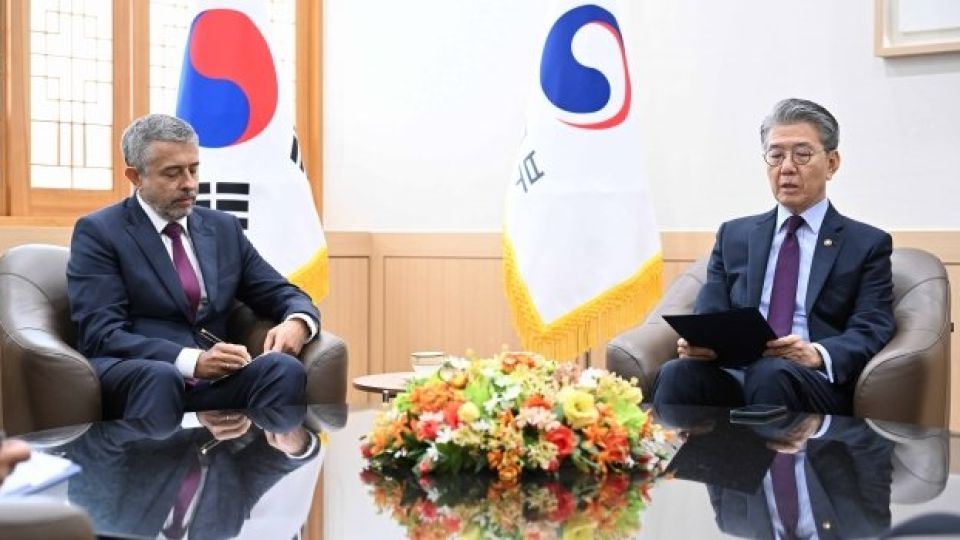October 22, 2024
SEOUL – South Korea’s First Vice Foreign Minister Kim Hong-kyun summoned Russian Ambassador Georgy Zinoviev on Monday to issue a stern warning over North Korea’s deployment of troops to Russia in support of its war in Ukraine — a move confirmed by Seoul’s intelligence agency last week — and to demand their immediate withdrawal.
The Foreign Ministry in Seoul said that the summoning of Russia’s top envoy was aimed at conveying the South Korean government’s “grave stance on North Korea dispatching troops to Russia and to strongly demand the immediate withdrawal of North Korean forces and an end to related military cooperation” between the two countries.
“Vice Minister Kim pointed out that the current situation, where military cooperation between Russia and North Korea has progressed from the transfer of military supplies to the actual deployment of North Korean troops, poses serious threats to both our country and the international community,” the Foreign Ministry said.
Kim also emphasized that the troop deployment violates multiple UN Security Council resolutions and the UN Charter.
“Vice Minister Kim condemned the illicit military cooperation, including the dispatch of North Korean troops to Russia, in the strongest terms and sternly warned that any actions threatening our core security interests will be met with a response using all available means in cooperation with the international community,” the Foreign Ministry in Seoul said.
The Foreign Ministry added, “Ambassador Zinoviev listened carefully to the South Korean government’s position and stated that he would report it accurately to his home country.”
South Korea’s spy agency claimed Friday that around 1,500 North Korean special forces had arrived in Russia’s Far East for adaptation training at local military bases, with a second batch expected to follow soon. However, the National Intelligence Service provided no concrete evidence to support the claim besides one satellite image of Russian vessels docked at Chongjin Port in North Hamgyong Province.
The Russian Embassy in Seoul stated Monday that during the meeting, Zinoviev emphasized that the “cooperation between the Russian Federation and the DPRK is conducted within the framework of international law and is not directed against the security interests of the Republic of Korea.”
The Republic of Korea is South Korea’s official name and the DPRK stands for North Korea’s official name, the Democratic People’s Republic of Korea.
During the meeting, Zinoviev also said that Russia and South Korea “hold opposing positions on what constitutes the cause of rising tensions on the Korean Peninsula,” according to the embassy.
Meanwhile, NATO Secretary-General Mark Rutte stated Monday on X that any deployment of North Korean troops to Ukraine to fight on Russia’s behalf would significantly escalate the conflict.
Rutte said he spoke with South Korean President Yoon Suk Yeol over NATO’s “close partnership” with Seoul, “defense industrial cooperation, and the interconnected security of the Euro-Atlantic and Indo-Pacific regions.”
“North Korea sending troops to fight alongside Russia in Ukraine would mark a significant escalation,” Rutte added on X.
Ukrainian President Volodymyr Zelenskyy has repeatedly and publicly claimed North Korean military involvement in the war in Ukraine.
In his video public message, Zelenskyy on Sunday said, “We have clear evidence that people are being supplied to Russia from North Korea, and these are not just workers for industries, but also military personnel.”
“We expect a normal, honest, strong reaction from our partners to this,” Zelenskyy added.
US Defense Secretary Lloyd Austin said on Saturday that he could not confirm reports of North Korea dispatching troops to Russia “at this point in time,” but added, “This is something that we will certainly continue to investigate.”
Illicit military cooperation between Pyongyang and Moscow has drawn increased attention after Russian President Vladimir Putin and North Korean leader Kim Jong-un signed a comprehensive strategic partnership during Putin’s visit to Pyongyang in June. The agreement included provisions for mutual defense assistance, signaling a deepening military alliance between the two countries. Putin has also submitted the treaty to the State Duma for ratification, marking a key step toward formalizing the defense pact.


